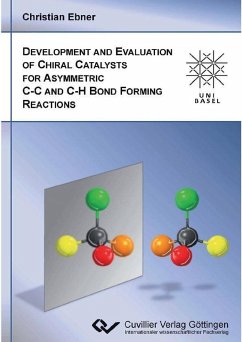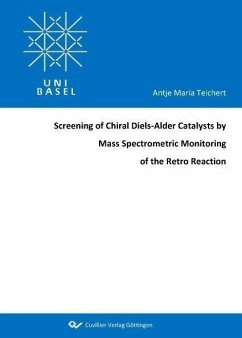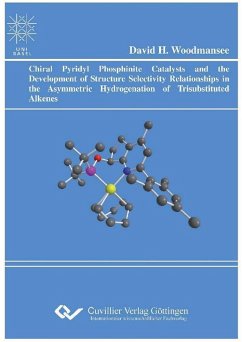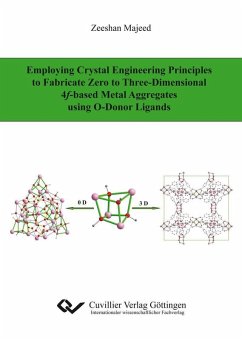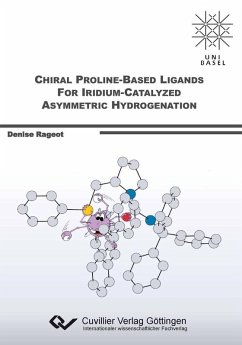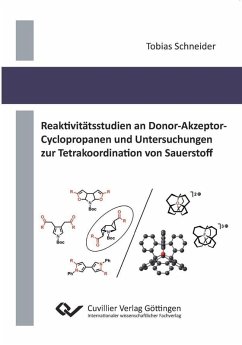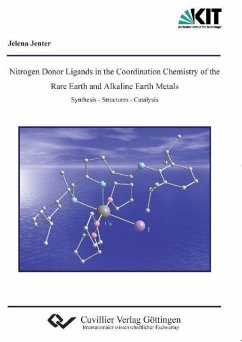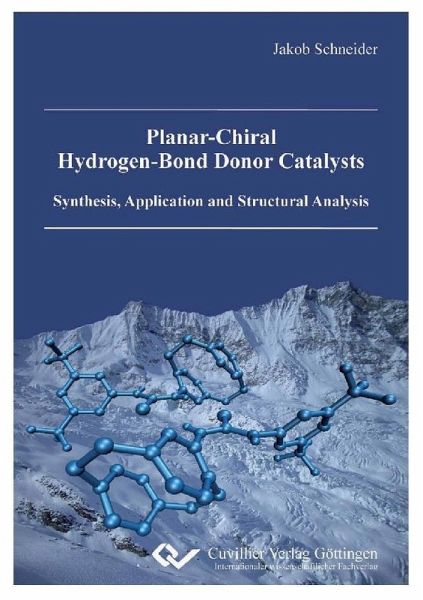
Planar-Chiral Hydrogen-Bond Donor Catalysts (eBook, PDF)
Synthesis, Application and Structural Analysis

PAYBACK Punkte
0 °P sammeln!
This thesis focuses on the first synthesis and application of planar-chiral [2.2]paracyclophane-
derived hydrogen-bond donor catalysts, thereby inducing a unique chiral motif into the
emerging field of thiourea organocatalysis. Reaction acceleration through hydrogen-bond
catalysis has made a significant impact on the field, rendering the development of potent
catalyst structures extremely valuable.
Based on the [2.2]paracyclophane scaffold, mono- and bi-functional thiourea catalysts were
prepared. The rigidity of the [2.2]paracyclophane structure leads to a u...
This thesis focuses on the first synthesis and application of planar-chiral [2.2]paracyclophane-
derived hydrogen-bond donor catalysts, thereby inducing a unique chiral motif into the
emerging field of thiourea organocatalysis. Reaction acceleration through hydrogen-bond
catalysis has made a significant impact on the field, rendering the development of potent
catalyst structures extremely valuable.
Based on the [2.2]paracyclophane scaffold, mono- and bi-functional thiourea catalysts were
prepared. The rigidity of the [2.2]paracyclophane structure leads to a unique setup of the
substituents. In pseudo-geminal position to the thiourea moiety, a hydroxy group was selected
and introduced as the second functionality. In a 12-step synthesis, the enantiopure hydroxy-
substituted [2.2]paracyclophanylene thiourea was obtained.
Furthermore, efficient access to enantiopure pseudo-geminally substituted 13-amino-4-
bromo[2.2]paracyclophane was developed. The aminobromide was employed in cross-
coupling reactions to yield arylated amino[2.2]paracyclophanes, exhibiting a broad range of
electronic and steric features useful for organocatalytic applications.
The developed catalysts were applied in asymmetric organic transformations and proved most
useful in the transfer hydrogenation reaction. The hydroxy-substituted thiourea catalyst
particularly exhibited catalytic activity and stereoselectivity. To shed light on the mode of
action of this class of hydrogen-bond catalysts, various analytic methods were conducted.
Through extensive crystallographic and NMR complexation experiments, the binding
properties of the catalysts were investigated in terms of their interaction with hydrogen-bond-
accepting functional groups. Furthermore, quantum chemical DFT and ab initio calculations
were undertaken to explore the favored conformations of [2.2]paracyclophane-derived
thioureas. The combined findings revealed substrate-dependent activation via single or double
hydrogen bonding between the NH groups of the thiourea and the respective substrate.
Furthermore, a class of readily accessible hydrogen-bond thiourea catalysts was developed,
derived from amino acids. Their steric and electronic features were modulated by their degree
of substitution at the carbinol carbon center. All catalysts were applied in the asymmetric
transfer hydrogenation of nitroolefins, furnishing the products in up to 99% yield and 87%
enantiomeric excess.
Dieser Download kann aus rechtlichen Gründen nur mit Rechnungsadresse in A, B, BG, CY, CZ, D, DK, EW, E, FIN, F, GR, HR, H, IRL, I, LT, L, LR, M, NL, PL, P, R, S, SLO, SK ausgeliefert werden.




